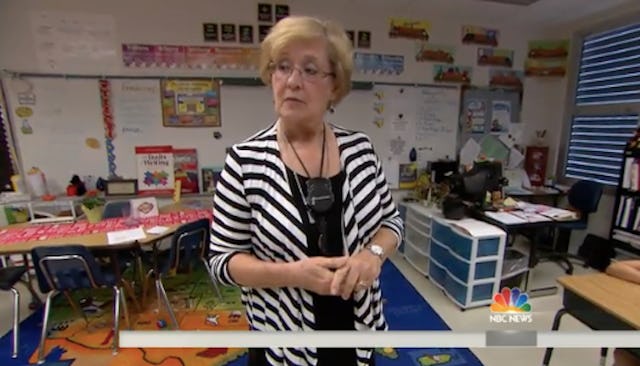One Teacher's Way Of Finding The Lonely Kids Is Pure Brilliance

Doyle’s message of inclusion and loneliness rings true in the wake of the most recent school shooting
With the horrific events in Florida last week where 17 innocent people lost their lives at Marjory Stoneman Douglas High School, a post is resurfacing from several years back about the importance of inclusion and really seeing those around you.
Glennon Doyle, a bestselling author and founder of the online community, Momastery, wrote about an interaction with her son Chase’s teacher, Kathy Pitt, and the educator’s method for finding the lonely kids. It’s so poignant and relevant to what’s happening around us now that it’s being recirculated for it’s critical message.
Doyle said she’d asked her son’s teacher to help her understand the new way they’ve been teaching long division after struggling to help him with his homework. “Afterwards, we sat for a few minutes and talked about teaching children and what a sacred trust and responsibility it is,” Doyle wrote. “We talked about shaping little hearts to become contributors to a larger community – and we discussed our mutual dream that those communities might be made up of individuals who are Kind and Brave above all.”
Doyle said the teacher then talked about her method for really seeing what’s happening in her classroom and who may be feeling lonely or isolated.
“Every Friday afternoon Chase’s teacher asks her students to take out a piece of paper and write down the names of four children with whom they’d like to sit the following week,” Doyle explained. She also asks the students to nominate one student whom they believe has been an exceptional classroom citizen that week.”
Then when the students leave for the weekend, she looks at the slips of paper and studies them for patterns.
“Who is not getting requested by anyone else? Who doesn’t even know who to request Who never gets noticed enough to be nominated? Who had a million friends last week and none this week?” she wrote.
“This story is about what happens when we go through our day and notice people who might not get noticed,” Doyle noted in the video.
Doyle said it’s not at all about finding “exceptional citizens” but about finding the lonely kids. “She’s looking for children who are struggling to connect with other children. She’s identifying the little ones who are falling through the cracks of the class’s social life. She’s pinning down- right away- who’s being bullied and who is doing the bullying.”
This teacher was brilliantly looking beneath the surface to figure out what exactly was going on and how her students were feeling about themselves and those around them. “It is like mining for gold – the gold being those little ones who need a little help – who need adults to step in and TEACH them how to make friends, how to ask others to play, how to join a group, or how to share their gifts with others.”
Doyle said his teacher had been doing this every single Friday since Columbine. “That’s the day she realized kids need to be seen,” Doyle said in the video.
“This brilliant woman watched Columbine knowing that ALL VIOLENCE BEGINS WITH DISCONNECTION,” Doyle wrote. “All outward violence begins as inner loneliness. She watched that tragedy KNOWING that children who aren’t being noticed will eventually resort to being noticed by any means necessary.”
It’s true. There have been studies and research linking loneliness and a need to connect, often early in life, to these mass shootings. Among other factors, we need to recognize this as quickly as possible and reach out to those who feel isolated. It’s not to say every person who is lonely will take such drastic measures later in life, but why would we want any human being to feel like that in the first place?
“I hope that’s the message they’re getting,” Pitt said in the video. “I care about you. I want you to care about each other.”
“Chase’s teacher retires this year – after decades of saving lives,” Doyle wrote. “What a way to spend a life: looking for patterns of love and loneliness. Stepping in, every single day- and altering the trajectory of our world.”
This article was originally published on